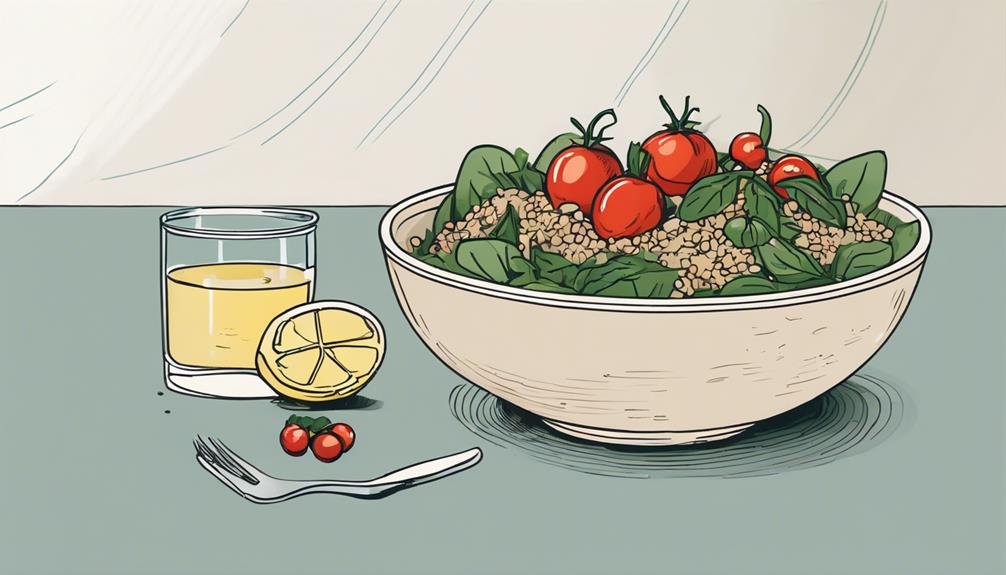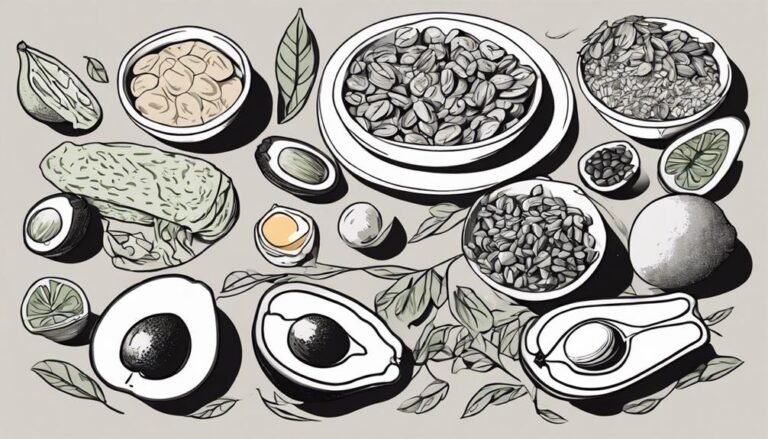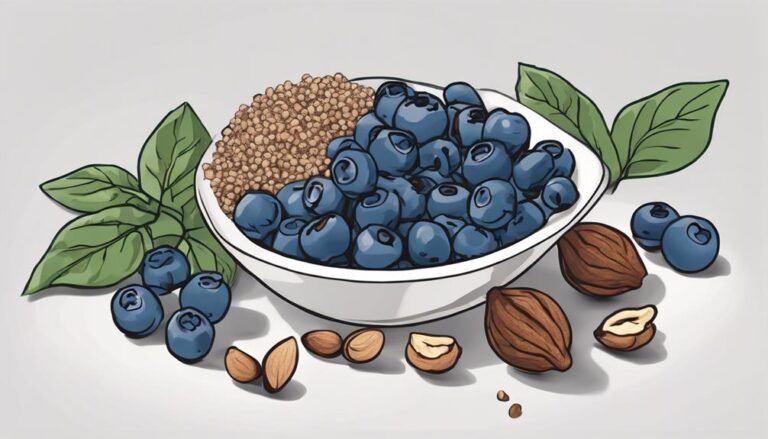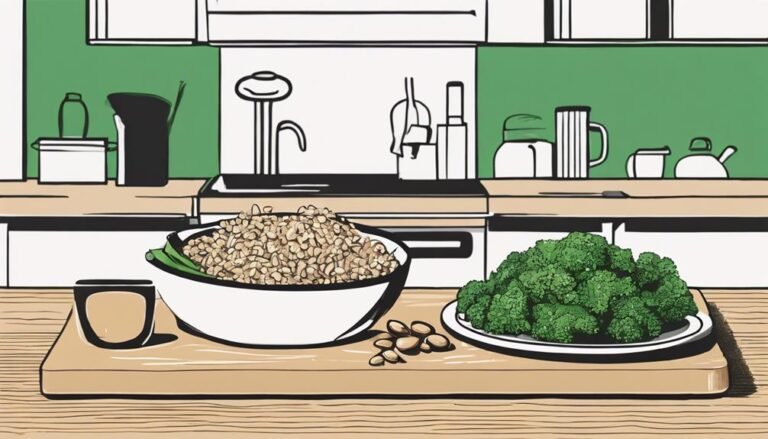What Should Men Over 40 Eat After Exercising?
After exercising, you should prioritize a balanced meal to support recovery. Aim for 20-30 grams of protein, like lean meats or Greek yogurt, to help muscle repair. Pair it with 30-50 grams of carbohydrates from sources like whole grains or fruit to replenish your energy levels. Including healthy fats—like those from nuts or avocado—will aid digestion without slowing you down. Don't forget hydration; drink 16-20 ounces of water or an electrolyte drink to replace lost fluids. Focusing on post-workout nutrition enhances your fitness journey, and there's much more you can discover about optimizing your diet.
Key Takeaways
- Consume 20-30 grams of protein from sources like lean meats, eggs, or Greek yogurt to support muscle repair and growth.
- Include 30-50 grams of carbohydrates from whole grains or fruits to replenish glycogen stores and provide energy.
- Add 10-15 grams of healthy fats from options like nuts or avocados to aid in recovery without slowing digestion.
- Hydrate with 16-20 ounces of water post-workout to replace lost fluids and support recovery processes.
Importance of Post-Workout Nutrition
Post-workout nutrition is vital because what you eat after exercise can greatly impact your recovery and overall performance. After a workout, your body craves nutrients to repair muscles, replenish energy stores, and reduce soreness. By consuming the right foods, you'll enhance recovery and prepare yourself for your next workout.
If you skip this important step, you might find yourself feeling fatigued, irritable, or less motivated to exercise again. In addition, post-workout meals can help maintain muscle mass, which is especially important as you age.
You want to support your body's recovery process and guarantee that you're getting the most out of your workouts. Prioritizing your nutrition after exercise is a simple yet powerful way to boost your fitness journey.
Ideal Macronutrient Ratios
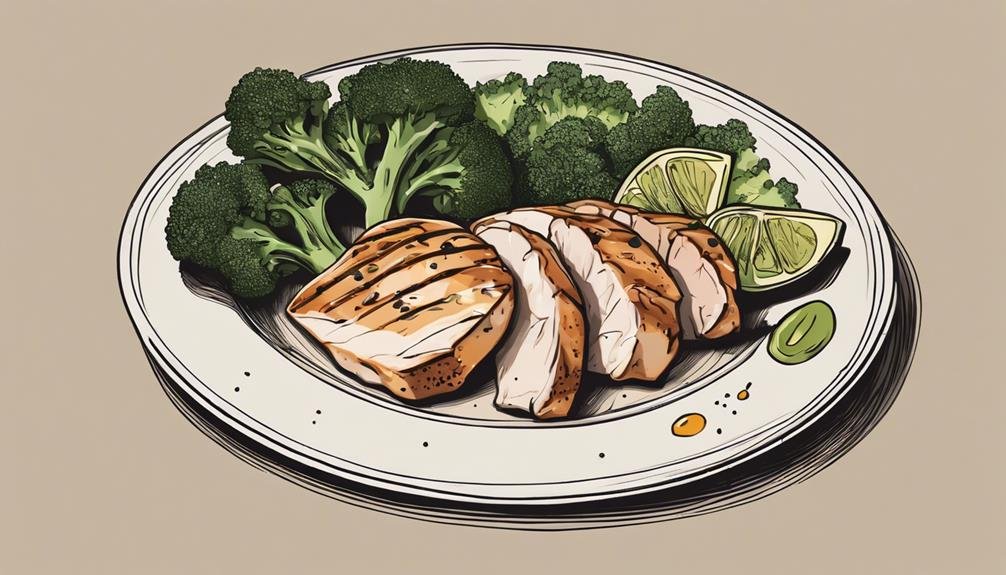
Finding the right macronutrient ratios after exercising can greatly enhance your recovery and muscle-building efforts. For men over 40, a balanced approach is vital. Here's a general guideline to reflect upon:
Protein: Aim for 20-30 grams to support muscle repair and growth.
Carbohydrates: Include a moderate amount (30-50 grams) to replenish glycogen stores, especially after intense workouts.
Fats: Keep healthy fats minimal (around 10-15 grams) to avoid slowing digestion but still provide essential fatty acids.
Hydration: Don't forget to hydrate; fluids are important for ideal recovery.
Best Protein Sources
To optimize recovery and muscle growth, you should focus on high-quality protein sources that deliver essential amino acids.
Lean meats like chicken, turkey, and fish are excellent choices, as they provide complete protein without the added fat.
Eggs are another fantastic option, packed with nutrients and easy to prepare.
If you prefer plant-based sources, consider legumes, lentils, and quinoa, which are rich in protein and fiber.
Greek yogurt is also a great post-workout snack, offering both protein and probiotics for gut health.
For convenience, protein shakes made from whey, casein, or plant-based powders can help you meet your protein needs quickly.
Incorporating these sources into your post-exercise meal will support your fitness goals effectively.
Essential Carbohydrates
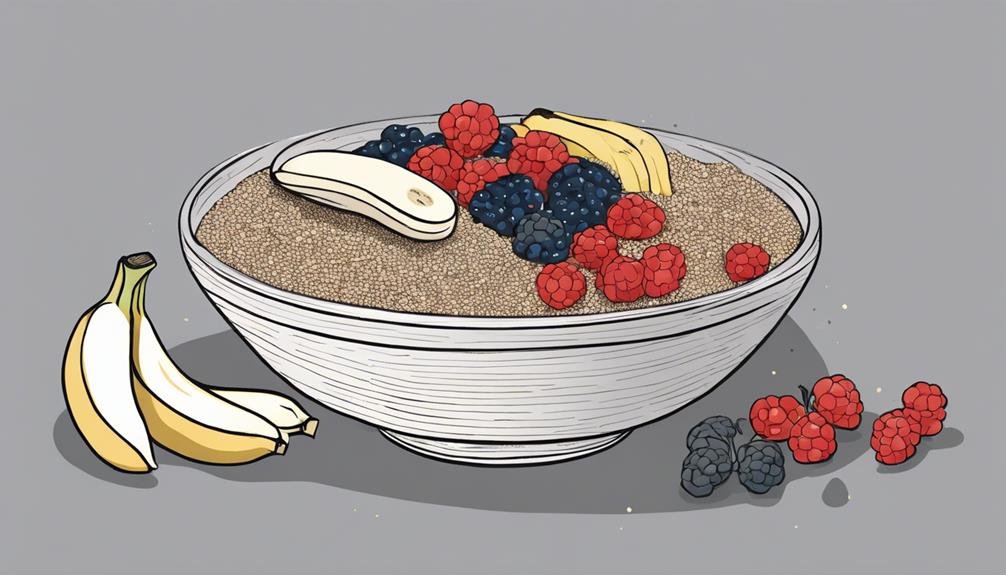
Essential carbohydrates play a crucial role in replenishing energy stores and aiding recovery after your workouts. After intense exercise, your body craves quick sources of energy, which is where these carbs come into play. Incorporating the right carbohydrates helps you bounce back faster and enhances your performance for the next session.
Consider these essential carbohydrate sources:
- Whole grains (like brown rice or quinoa) for sustained energy
- Fruits (especially bananas and berries) for quick sugar and vitamins
- Sweet potatoes for a nutrient-rich option
Choosing the right carbohydrates post-exercise won't only fuel your muscles but also support overall recovery, keeping you fit and ready for future workouts.
Hydration and Recovery
Proper hydration is essential for recovery after exercising, as it helps replace lost fluids and supports overall bodily functions.
When you work out, you lose water through sweat, and not replenishing it can lead to fatigue and decreased performance. Aim to drink water immediately after your workout; a good rule of thumb is to consume at least 16-20 ounces.
If your exercise is particularly intense or prolonged, consider adding an electrolyte drink to restore crucial minerals. Monitor your hydration status by checking the color of your urine; it should be light yellow.
Questions
Can Supplements Replace Whole Foods After Exercise?
Supplements can't fully replace whole foods after exercise. They might provide convenience, but whole foods offer essential nutrients and benefits you need for recovery. It's best to focus on a balanced diet for ideal results.
How Soon After Working Out Should I Eat?
You should aim to eat within 30 to 60 minutes after working out. This timeframe helps your body recover effectively, replenishing energy stores and repairing muscles, so you can maximize your workout results.
Are There Specific Foods to Avoid Post-Workout?
After working out, you should avoid sugary snacks, excessive fats, and processed foods. These can hinder recovery and energy replenishment. Focus on whole foods instead, as they support better muscle repair and overall health.
How Does Age Affect Post-Exercise Nutrition Needs?
As the years stack like autumn leaves, your body's nutritional needs shift. You need more protein and healthy fats to repair and fuel muscles, while hydration becomes essential for recovery. Your age deserves tailored nutrition.
Should I Adjust My Portion Sizes as I Age?
As you age, your metabolism slows down, and your nutritional needs change. You might want to adjust portion sizes to prevent weight gain while ensuring you're still getting essential nutrients for overall health and recovery.
Conclusion
In the journey of fitness, think of your post-workout meal as the fuel that keeps your engine running smoothly.
Just like a car needs the right oil to function, your body craves the perfect blend of proteins, carbs, and hydration to repair and rejuvenate.
By nourishing yourself wisely, you're not just refueling; you're paving your path to strength and liveliness.
So, embrace these choices and watch as your efforts blossom into a healthier, more vibrant you.

